人教版精通英语六年级上学期重点词组句型
人教精通版六年级英语上册各单元知识点汇总

人教精通版六年级英语上册各单元知识点汇总Unit 1 I go to school at 8:00.单元知识必备清单重点词汇breakfast 早餐lunch 午餐dinner 晚餐walk 走; 步行every 每一个morning 早晨evening 晚上; 傍晚often 时常; 常常afternoon 下午easy 容易difficult 困难重点短语see a film 看电影clean the window 擦窗户c lean the door 擦门clean the floor 擦地板get up 起床take a walk 散步go to school 去上学have breakfast 吃早餐go home 回家go to bed 睡觉cook breakfast 做早餐teach English 教英语read stories 读故事have lunch 吃午饭have dinner 吃晚饭play the piano 弹钢琴重点句型1 School begins at 9:00. 九点钟开始上课。
解读: 该句是一般现在时,其中主语School 是第三人称单数,所以谓语动词begin 用第三人称单数形式begins。
“School begins.”的同义句为“Class begins.”。
2 School is over at 3:30 in the afternoon. 下午三点半放学。
解读: 该句是谓语为系动词的一般现在时句型,主语School 是第三人称单数,所以be动词用is,“be over”意为“结束”,over 在此处是副词。
3 She gets up at 6:00 in the morning. 她在早晨六点起床。
She doesn’t get up at 6:30 in the morning. 她不在早晨六点半起床。
解读: 在一般现在时的肯定句中,主语是第三人称单数时,谓语动词要用第三人称单数形式。
人教版六年级英语上册全部单词+重点句型汇总

人教版六年级英语上册全部单词+重点句型汇总单词列表PEP人教版小学六年级上册单词表Unit 1science[5´saiEnsss]科学museum[mmju:´ziEmj]博物馆post office [pəust ˈɔfis]邮局bookstore [bukstɔː]书店cinema [ˈsinimə]电影院hospital [ˈhɔspitl]医院crossing [ˈkrɔsiŋ]十字路口turn [təːn]转弯left [left]左straight [streit]笔直地right [rait]右ask[ɑːsk]问sir [səː, sə](对男子的礼貌称呼)先生interesting[ˈintristiŋ]有趣的Italian[iˈtæljən]意大利的restaurant[ˈrestrɔnt]餐馆pizza[ˈpiːtsə]比萨饼street[striːt]大街;街道get[ɡet]到达GPS[dʒiː piː es]全球(卫星)定位系统gave[ɡeiv](give[ɡiv]的过去式)提供;交给feature[ˈfiːtʃə]特点follow[ˈfɔləu]跟着far[fɑː]较远的tell[tel]告诉1.---Where is the restaurant? 餐厅在哪里?----It’s next to the park on Dong fang Street. 它在东方路,在公园附近。
2.---How can we get there? 我们怎么去哪里?----Turn left at the bookstore. Then turn right at the hospital.书店左转,然后医院右转。
3. He now has GPS. 他现在有GPS。
4. What an interesting film! 多么有趣的电影!Unit 2on foot [ɔn] [fut]步行by[bai](表示方式)乘bus[bʌs]公共汽车plane [plein]飞机taxi[ˈtæksi]出租汽车ship[ʃip](大)船subway[ˈsʌbwei]地铁train[trein]火车slow[sləu]慢的down[daun]减少;降低slow down[sləu] [daun]慢下来stop[stɔp]停下Mrs[ˈmisiz]夫人early[ˈəːli]早到的helmet[ˈhelmit]头盔must[mʌst]必须wear[wɛə]戴attention[əˈtenʃən]注意pay attention to[pei]注意pay[pei] v.付款;给予(注意) n.工资traffic[ˈtræfik]交通traffic lights交通信号灯Munich[ˈmju:nik]慕尼黑(德国城市)Germany[ˈdʒə:məni]德国Alaska[əˈlæskə]阿拉斯加州(美国州名)sled[sled]雪橇fast[fɑ:st]快的ferry[ˈferi]轮渡Papa Westray[,pɑːpəˈwestrei]帕帕韦斯特雷岛Scotland [ˈskɔtlənd]苏格兰1.---How do you come to school? 你怎么上学?----Usually, I come on foot. 通常我走路来的。
人教版精通英语六年级上学期重要资料词组句型

Lesson 1I.单词俱乐部1.minute ['minit] 分钟2.primary ['praiməri] 初级的3.daily [`deili] 日常的4.dinner [`dinə ] 正餐II.词组大本营1. tell you about 告诉你…关于2. get up 起床3. go to school 去上学4. seven subjects 七门课5. be over 结束6. do some reading 读书,阅读7. have dinner吃晚餐8. after dinner饭后9.watch TV看电视10. go to bed 去睡觉11. best wishes良好祝愿III.句子大观园1. Let me tell you about my daily life. 让我告诉你我的每日生活。
2. We have seven subjects. 我们有七门课。
3. School is over at 3:30 in the afternoon. 学校下午3点半放学。
4. After dinner, I watch TV for 30 minutes and do some reading.. 晚饭后我看半小时电视和读书。
5. Can you tell me by e-mail? 你能通过电子邮件告诉我吗?Lesson 2I.单词俱乐部1. have [hæv] 有2. breakfast ['brekfəst] 早餐3.lunch [lʌntʃ] 午餐II.词组大本营1. go to school 去上学2. go to school 去上学3. go to bed 去睡觉4. watch TV看电视5. have breakfast吃早餐6. have lunch 吃午餐7. have dinner吃晚餐8. go home回家III.句子大观园1. I have breakfast at 7:30 in the morning. 我早晨7点半吃早餐。
人版精通英语六年级上学期重点词组句型
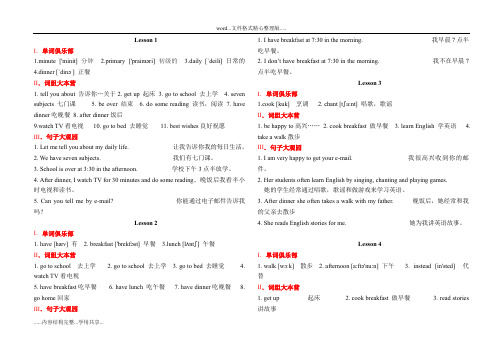
Lesson 1I.单词俱乐部1.minute ['minit] 分钟2.primary ['praiməri] 初级的3.daily [`deili] 日常的4.dinner [`dinə ] 正餐II.词组大本营1. tell you about 告诉你…关于2. get up 起床3. go to school 去上学4. seven subjects 七门课5. be over 结束6. do some reading 读书,阅读7. have dinner吃晚餐8. after dinner饭后9.watch TV看电视10. go to bed 去睡觉11. best wishes良好祝愿III.句子大观园1. Let me tell you about my daily life. 让我告诉你我的每日生活。
2. We have seven subjects. 我们有七门课。
3. School is over at 3:30 in the afternoon. 学校下午3点半放学。
4. After dinner, I watch TV for 30 minutes and do some reading.. 晚饭后我看半小时电视和读书。
5. Can you tell me by e-mail? 你能通过电子邮件告诉我吗?Lesson 2I.单词俱乐部1. have [hæv] 有2. breakfast ['brekfəst] 早餐3.lunch [lʌntʃ] 午餐II.词组大本营1. go to school 去上学2. go to school 去上学3. go to bed 去睡觉4. watch TV看电视5. have breakfast吃早餐6. have lunch 吃午餐7. have dinner吃晚餐8. go home回家III.句子大观园1. I have breakfast at 7:30 in the morning. 我早晨7点半吃早餐。
小学英语人教精通版六年级上册重点归纳

小学英语人教精通版六年级上册重点归纳第一单元Unit 1 I go to school at 8:00重点单词:lunch 午餐dinner 晚餐walk 走;步行every 每一个morning 早上afternoon 下午evening 晚上often 时常;常常easy 容易difficult困难重点词组:1. daily life 日常生活2. get up 起床3. in the morning 在早晨\上午4. in the afternoon 在下午5. in the evening 在晚上6. have breakfast 吃早餐7. have lunch 吃午餐8. have dinner 吃晚餐9. go to school 去上学10. go home 回家11. watch TV 看电视12. do some reading 阅读13. go to bed 睡觉14. cook breakfast 做早餐15. take a walk 散步16. teach English 教英语17. read stories 读故事18. every morning 每天早晨19. on Saturdays 在星期六20. on Sundays 在星期日21. see a film 看电影22. have piano lessons 上钢琴课23. play the piano 弹钢琴24. at home 在家25. help sb. to do the housework 帮助某人做家务26. clean the door 擦门27. clean the window 擦窗户28. clean the floor 擦地板重点句型:1.I don’t have breakfast at 7:00 in the morning . 我不是在早上七点钟吃早餐。
2.She gets up at 6:00 in the morning . 她在早上六点钟起床。
最新人教版六年级上册重点短语整理

最新人教版六年级上册重点短语整理本文收集了最新人教版六年级上册的重点短语,供大家参考:- 问路- Excuse me, how can I get to...? 对不起,请问去...怎么走?- Is it far from here? 这离这儿远吗?- Can I go on foot? 我能走路去吗?- Where is the nearest...? 最近的...在哪里?- 祝愿- Congratulations! 恭喜!- Good luck! 祝你好运!- Happy birthday! 生日快乐!- Merry Christmas! 圣诞快乐!- 问候- How are you? 你好吗?- Nice to meet you! 很高兴见到你!- Have a good day! 祝你今天愉快!- Take care! 保重!- 时间- What day is it today? 今天星期几?- What's the date today? 今天几号?- What time is it now? 现在几点了?- How long will it take? 要花多长时间?- 点餐- What would you like to eat/drink? 你想吃/喝什么?- Can I have the menu, please? 请给我菜单。
- I'll have... 我要...- How much is it? 多少钱?- 数字- Can you spell it for me? 能拼写一下吗?- One, two, three, four, five, six, seven, eight, nine, ten. 一、二、三、四、五、六、七、八、九、十。
- Eleven, twelve, thirteen, fourteen, fifteen, sixteen, seventeen, eighteen, nineteen, twenty. 十一、十二、十三、十四、十五、十六、十七、十八、十九、二十。
人教版精通英语六年级上学期重点词组句型

人教版精通英语六年级上学期重点词组句型Lesson 1I.单词俱乐部1.minute ['minit] 分钟2.primary ['praim?ri] 初级的3.daily [`deili] 日常的4.dinner [`din? ] 正餐II.词组大本营1. tell you about 告诉你…关于2. get up 起床3. go to school 去上学4. seven subjects 七门课5. be over 结束6. do some reading 读书,阅读7. have dinner吃晚餐8. after dinner饭后9.watch TV看电视10. go to bed 去睡觉11. best wishes良好祝愿III.句子大观园1. Let me tell you about my daily life. 让我告诉你我的每日生活。
2. We have seven subjects. 我们有七门课。
3. School is over at 3:30 in the afternoon. 学校下午3点半放学。
4. After dinner, I watch TV for 30 minutes and do some reading.. 晚饭后我看半小时电视和读书。
5. Can you tell me by e-mail? 你能通过电子邮件告诉我吗?Lesson 2I.单词俱乐部1. have [h?v] 有2. breakfast ['brekf?st] 早餐3.lunch [l?nt?] 午餐II.词组大本营1. go to school 去上学2. go to school 去上学3. go to bed 去睡觉4. watch TV看电视5. have breakfast吃早餐6. have lunch 吃午餐7. have dinner吃晚餐8. go home回家III.句子大观园1. I have breakfast at 7:30 in the morning. 我早晨7点半吃早餐。
人教版六年级上册英语知识点
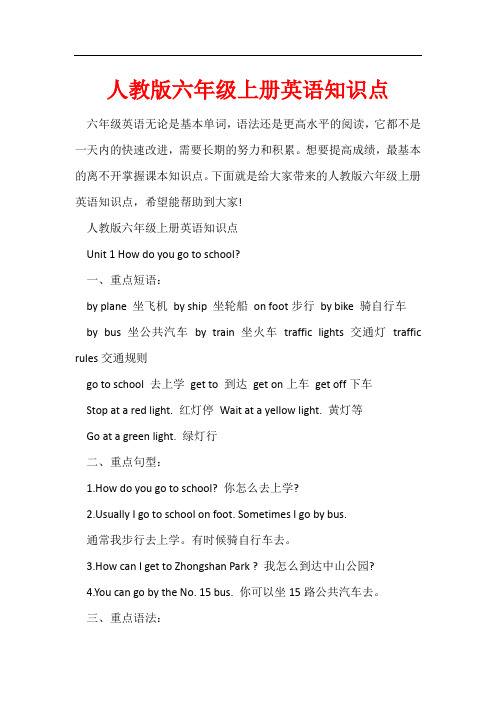
人教版六年级上册英语知识点六年级英语无论是基本单词,语法还是更高水平的阅读,它都不是一天内的快速改进,需要长期的努力和积累。
想要提高成绩,最基本的离不开掌握课本知识点。
下面就是给大家带来的人教版六年级上册英语知识点,希望能帮助到大家!人教版六年级上册英语知识点Unit 1 How do you go to school?一、重点短语:by plane 坐飞机by ship 坐轮船on foot步行by bike 骑自行车by bus 坐公共汽车by train 坐火车traffic lights 交通灯traffic rules交通规则go to school 去上学get to 到达get on上车get off下车Stop at a red light. 红灯停Wait at a yellow light. 黄灯等Go at a green light. 绿灯行二、重点句型:1.How do you go to school? 你怎么去上学?ually I go to school on foot. Sometimes I go by bus.通常我步行去上学。
有时候骑自行车去。
3.How can I get to Zhongshan Park ? 我怎么到达中山公园?4.You can go by the No. 15 bus. 你可以坐15路公共汽车去。
三、重点语法:1、There are many ways to go somewhere.到一个地方去有许多方法。
这里的ways一定要用复数。
因为there are是There be句型的复数形式。
2、on foot 步行乘坐其他交通工具大都可以用介词by…,但是步行只能用介词on 。
4、go to school的前面绝对不能加the,这里是固定搭配。
5、USA 和US 都是美国的意思。
另外America也是美国的意思。
6、go to the park 前面一定要加the. 如果要去的地方有具体的名字,就不能再加the ,如果要去的地方没有具体名字,都要在前面加the. ( go to school除外。
人教精通英语六年级上册句型单词总结
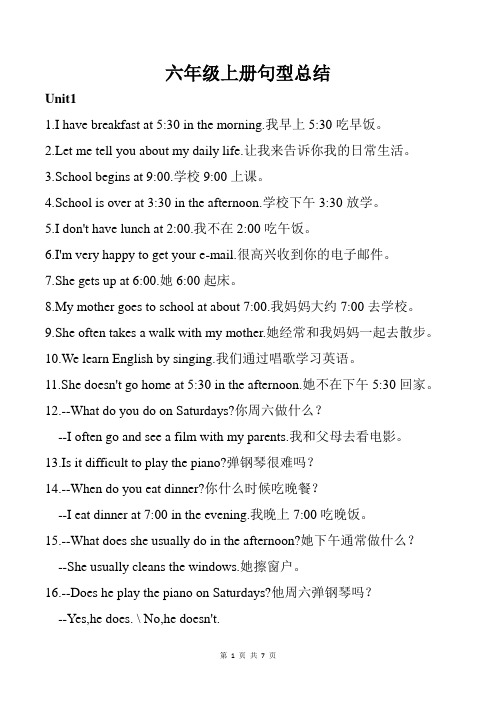
六年级上册句型总结Unit11.I have breakfast at 5:30 in the morning.我早上5:30吃早饭。
2.Let me tell you about my daily life.让我来告诉你我的日常生活。
3.School begins at 9:00.学校9:00上课。
4.School is over at 3:30 in the afternoon.学校下午3:30放学。
5.I don't have lunch at 2:00.我不在2:00吃午饭。
6.I'm very happy to get your e-mail.很高兴收到你的电子邮件。
7.She gets up at 6:00.她6:00起床。
8.My mother goes to school at about 7:00.我妈妈大约7:00去学校。
9.She often takes a walk with my mother.她经常和我妈妈一起去散步。
10.We learn English by singing.我们通过唱歌学习英语。
11.She doesn't go home at 5:30 in the afternoon.她不在下午5:30回家。
12.--What do you do on Saturdays?你周六做什么?--I often go and see a film with my parents.我和父母去看电影。
13.Is it difficult to play the piano?弹钢琴很难吗?14.--When do you eat dinner?你什么时候吃晚餐?--I eat dinner at 7:00 in the evening.我晚上7:00吃晚饭。
15.--What does she usually do in the afternoon?她下午通常做什么?--She usually cleans the windows.她擦窗户。
小学英语人教精通版六年级上册重点归纳

小学英语人教精通版六年级上册重点归纳第一单元Unit 1 I go to school at 8:00重点词组:1. daily life 日常生活2. get up 起床3. in the morning 在早晨\上午4. in the afternoon 在下午5. in the evening 在晚上6. have breakfast 吃早餐7. have lunch 吃午餐8. have dinner 吃晚餐9. go to school 去上学10. go home 回家11. watch TV 看电视12. do some reading 阅读13. go to bed 睡觉14. cook breakfast 做早餐15. take a walk 散步16. teach English 教英语17. read stories 读故事18. every morning 每天早晨19. on Saturdays 在星期六20. on Sundays 在星期日21. see a film 看电影22. have piano lessons 上钢琴课23. play the piano 弹钢琴24. at home 在家25. help sb. to do the housework 帮助某人做家务26. clean the door 擦门27. clean the window 擦窗户28. clean the floor 擦地板29. eat lunch 吃午餐重点句型:1.I don’t have breakfast at 7:00 in the morning . 我不是在早上七点钟吃早餐。
2.She gets up at 6:00 in the morning . 她在早上六点钟起床。
3.She doesn’t get up at 6:30 in the morning . 她不是在早上6:30起床。
完整版)小学英语人教精通版六年级上册重点归纳
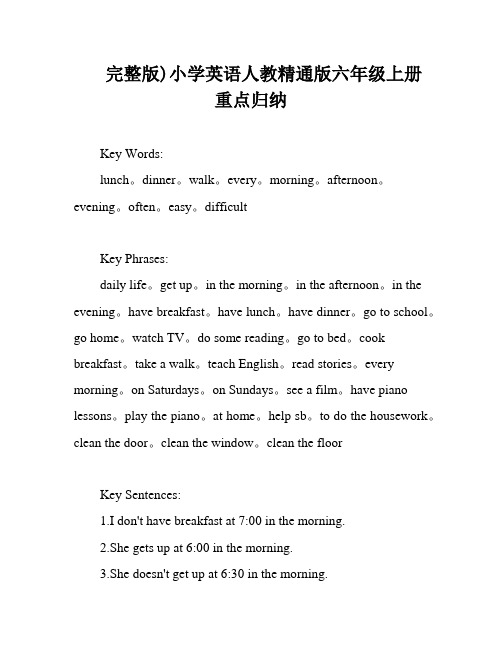
完整版)小学英语人教精通版六年级上册重点归纳Key Words:lunch。
dinner。
walk。
every。
morning。
afternoon。
evening。
often。
easy。
difficultKey Phrases:daily life。
get up。
in the morning。
in the afternoon。
in the evening。
have breakfast。
have lunch。
have dinner。
go to school。
go home。
watch TV。
do some reading。
go to bed。
cook breakfast。
take a walk。
teach English。
read stories。
every morning。
on Saturdays。
on Sundays。
see a film。
have piano lessons。
play the piano。
at home。
help sb。
to do the housework。
clean the door。
clean the window。
clean the floorKey Sentences:1.I don't have breakfast at 7:00 in the morning.2.She gets up at 6:00 in the morning.3.She doesn't get up at 6:30 in the morning.4.What does Kate do on Saturdays?5.She usually plays the piano.6.I have breakfast at 7:30.In daily life。
we have three meals a day: lunch。
dinner。
and breakfast。
We often walk to school。
最新人教版精通英语六年级上学期重点词组句型
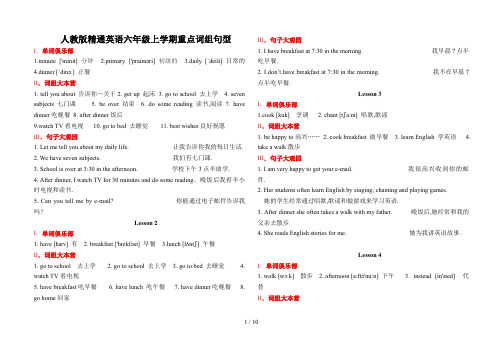
人教版精通英语六年级上学期重点词组句型I.单词俱乐部1.minute ['minit] 分钟2.primary ['praiməri] 初级的3.daily [`deili] 日常的4.dinner [`dinə ] 正餐II.词组大本营1. tell you about 告诉你…关于2. get up 起床3. go to school 去上学4. seven subjects 七门课5. be over 结束6. do some reading 读书,阅读7. have dinner吃晚餐8. after dinner饭后9.watch TV看电视10. go to bed 去睡觉11. best wishes良好祝愿III.句子大观园1. Let me tell you about my daily life. 让我告诉你我的每日生活.2. We have seven subjects. 我们有七门课.3. School is over at 3:30 in the afternoon. 学校下午3点半放学.4. After dinner, I watch TV for 30 minutes and do some reading.. 晚饭后我看半小时电视和读书.5. Can you tell me by e-mail? 你能通过电子邮件告诉我吗?Lesson 2I.单词俱乐部1. have [hæv] 有2. breakfast ['brekfəst] 早餐3.lunch [lʌntʃ] 午餐II.词组大本营1. go to school 去上学2. go to school 去上学3. go to bed 去睡觉4. watch TV看电视5. have breakfast吃早餐6. have lunch 吃午餐7. have dinner吃晚餐8. go home回家III.句子大观园1. I have breakfast at 7:30 in the morning. 我早晨7点半吃早餐.2. I don’t have breakfast at 7:30 in the morning. 我不在早晨7点半吃早餐.Lesson 3I.单词俱乐部1.cook [kuk] 烹调2. chant [tʃa:nt] 唱歌,歌谣II.词组大本营1. be happy to高兴……2. cook breakfast 做早餐3. learn English 学英语4. take a walk散步III.句子大观园1. I am very happy to get your e-mail. 我很高兴收到你的邮件.2. Her students often learn English by singing, chanting and playing games.她的学生经常通过唱歌,歌谣和做游戏来学习英语.3. After dinner she often takes a walk with my father. 晚饭后,她经常和我的父亲去散步4. She reads English stories for me. 她为我讲英语故事.Lesson 4I.单词俱乐部1. walk [wɔːk] 散步2. afternoon [a:ftə'nu:n] 下午3. instead [in'sted] 代替II.词组大本营1 / 101. get up 起床2. cook breakfast 做早餐3. read stories 讲故事4. teach English 教英语5. take a walk 散步6. in groups 按小组7. a few photos of your family 几张你家的照片III.句子大观园1. She gets up at 6:00 in the morning. 她早上6点起床.2. She doesn’t get up at 6:00 in the morning. 她早上6点不起床.Lesson 5I.单词俱乐部1.film [film] 电影2.parents ['pεərənts]父母3.difficult ['difikəlt] 困难的4. always [ˈɔːlweɪz] 总是5.practise ['præktis] 练习II.词组大本营1. on Saturdays 在周六2. see a film 看电影3. play the piano 弹钢琴4. learn from 向……学习III.句子大观园1. I often go and see a film with my parents. 我经常和我的父母去看电影.2. I uaually have piano lessons. 我经常上钢琴课3. Is it difficult to play the piano? 弹钢琴难吗?4. She practises it at home. 她在家练习.Lesson 6I.单词俱乐部1. usually [[ˈjuːʒʊəlɪ] 通常2. difficult ['difikəlt] 困难的3. film [film] 电影4. easy ['i:zi] 容易的5. floor [flɔ:] 地板6. inside [in'said] 里面II.词组大本营1. see a film 看电影2. play the piano 弹钢琴3.clean the window 擦窗户4. clean the door 擦门5. clean the floor 擦地III.句子大观园1.What do you usually do on Saturdays? 你通常在周六做什么?2. I often go and see a film. 我经常去看电影.3. What does Kate do on Saturdays? Kate在周六做什么?3. She usually plays the piano. 她通常弹钢琴.Lesson 7I.单词俱乐部II.词组大本营1.collect stamps 收集邮票 4. collect toy cars 收集玩具汽车2. a super car 一辆漂亮的汽车 5. so colourful 如此鲜艳1.hobby [ˈhɒbɪ]业余爱好2.collect [kəˈlekt]收集3.stamp [stæmp]邮票4.paper [ˈpeɪpə]纸5.colourful [ˈkʌləfʊl]多彩的6.enjoy [ɪnˈdʒɔɪ]享受7.toy [tɔɪ]玩具2 / 103.your hobby 你的爱好 6. have a look 看一看III.句子大观园1.Open the box and see. 打开盒子看一看.2.Can I have a look, please? 我能看一看吗?3.I like collecting picture cards. 我喜欢收集卡片.Lesson 8I.单词俱乐部1.picture [ˈpɪktʃə]图片,照片 4.hobby [ˈhɒbɪ]爱好2.car [kɑː]小汽车 5.colour [ˈkʌlə]颜色3.collect [kəˈlekt]收集II.词组大本营1.collect toy cars收集玩具汽车 3. collect maps 收集地图2.collect picture cards收集图片 4. collect stamps收集邮票III.句子大观园1.What’s your hobby? 你的爱好是什么?2.My hobby is collecting maps. 我的爱好是收集地图.Lesson 9I.单词俱乐部1.photo [ˈfəʊtəʊ]照片 4. grandpa [ˈgrænˌpɑː]爷爷2.plant [plɑːnt]种植 5. Grow [grəʊ]种植3.flower [ˈflaʊə]花 6.wonderful[ˈwʌndəfʊl] 极好的II.词组大本营1.look at 看2. drink Chinese tea 喝茶3.plant flowers 种花III.句子大观园1.Do you want to look at my family photos? 你想看看我的家庭照片吗?2.My grandpa is fishing. 我的爷爷正在钓鱼.3.She is singing at her birthday party. 她正在她的生日聚会上唱歌.Lesson 10I.单词俱乐部1.plant [plɑːnt]种植2. flower [ˈflaʊə]花II.词组大本营1.go fishing 去钓鱼2. plant flowers 种花3.cook meals 做饭III.句子大观园1.What’s your dad’s hobby? 你父亲的爱好是什么?2.His hobby is planting flowers. 他的爱好是种花.3.What’s your grandpa’s hobby? 你爷爷的爱好是什么?4.His hobby is fishing. 他的爱好是钓鱼.Lesson 11I.单词俱乐部1.cry [kraɪ] 叫喊 3. kid [k i d] 小孩2.cute [kjuːt] 可爱的;漂亮的 4. hungry ['hʌŋgr i] 饥饿的II.词组大本营1.be interested in 对 3. make dolls 制作娃娃2.take photos 照相 4. take good care of 好好照顾III.句子大观园1.What are you interested in? 你对什么感兴趣?3 / 102.I’m interested in taking photos. 我对照相感兴趣.3.She takes good care of the baby. 她好好照顾婴儿.Lesson 12I.单词俱乐部puter[kəm'pjuːtə] 计算机 3. place [ple i s] 地方2.thick [θi k] 厚的 4. crane [kre i n] 鹤II.词组大本营1.玩电脑游戏2. make dolls 制作娃娃2.take photos 照相III.句子大观园1.What are you interested in? 你对什么2.I’m interested in taking photos. 我对照相感兴趣.Lesson 13I.单词俱乐部1. birthday [ˈbɜːθˌdeɪ]生日2. pick /pik/拾,摘3. date /deit/日期4. party [ˈpɑːtɪ]聚会5. invitation / [ˌɪnvɪˈteɪʃən]邀请(n)6. celebrate [ˈselɪˌbreɪt]庆祝II.词组大本营1.birthday party 来参加我的生日聚会2. celebrate your birthday 庆祝你的生日3. invitation cards 邀请函III.句子大观园1. birthday party? 你愿意来参加我的生日聚会吗?2. Sure! I’d love to.太棒了,我很愿意去.3. What about you? 你呢?4. What time does your party begin? 你的聚会几点开始?.Lesson 14I.单词俱乐部1. after [ˈɑːftə]在……之后2. then /[ðen]然后3.bye /bai/ 再见4. bow /bəu/ 弓5. arrow / [ˈærəʊ]箭头II.词组大本营1. invite your friends to your party 邀请你的朋友参加聚会2. celebrate your birthday with your friends 与你的朋友们庆祝生日3. give a birthday card to your friend 给你的朋友一张生日卡片III.句子大观园1. Here’s a card for you. 送给你一张卡片.Lesson 15I.单词俱乐部1. kind /kaind/种类2. chocolate / [ˈtʃɒkəlɪt]巧克力3. shape /ʃeip/形状4. pie/pai/5. jelly [ˈdʒelɪ果冻II.词组大本营1. a birthday cake一个生日蛋糕2. would like想要3. a chocolate cake一个巧克力蛋糕4. star-shaped cake 星形蛋糕.5. heart-shaped cake 心形蛋糕.II.句子大观园4 / 101. What kind of cake would you like? 你想要哪种蛋糕?2. I’d like a chocolate cake. 我想要个巧克力蛋糕.3. It can show our love for you. 它能表达我们对你的爱.Lesson 16I.单词俱乐部1. ice cream /aiskri:m/冰淇淋2.candy [ˈkændɪ]饼干3. powerful [ˈpaʊəfʊl]强大的II.词组大本营1. fruit pie 水果馅饼III.句子大观园1.Can I have some ice cream? 我能买一些冰淇淋吗?Lesson 17I.单词俱乐部[ˈwelkəm]欢迎2. light /lait/点燃3. candle [ˈkændəl /蜡烛4. wish / wɪʃ/祝,愿望5. blow /bləu/吹II.词组大本营欢迎到…2. light the candles点燃蜡烛3. sing the birthday song唱生日歌4. make a wish许愿5. blow out吹灭III.句子大观园1. Here are some chocolates for you. 送给你一些巧克力.2.Make a wish and blow out the candles. 许一个愿望然后吹灭蜡烛.Lesson 18 I.单词俱乐部1. joy [dʒɔɪ]欢乐,快乐2. share [ʃeə] 分享3. clap [klæp] 鼓掌II.词组大本营1. cut the cake切蛋糕2. eat the cake 吃蛋糕III.句子大观园1. Here is a birthday cake for you. 送给你一个生日蛋糕.Lesson 19I.单词俱乐部1. January [ˈdʒænjʊərɪ] n. 一月2. February [ˈfebrʊər ɪ] n. 二月3.month [mʌnθ] n.月4. year [jɪə]年 5 Spring [sprɪŋ] n. 春天6. festival [ˈfestɪvəl] n. 节日II.词组大本营1. New Year’s Day新年2. the Spring Festival春节III.句子大观园1. The first day, January 1st, is called New Year’s Day. 一月份的第一天,一月一日是新年.2. They go back home to celebrate the festival with their families. 他们赶回家5 / 10与家人共同欢度节日.Lesson 20I.词组大本营1. the first month of the year 每年的第一个月份2. the second month of the year 每年的第二个月份Lesson 21I.单词俱乐部1. March [mɑːtʃ] n. 三月2. April [ˈeɪprəl] n. 四月3. Easter [ˈiːstə] n. 复活节4. during 在……的时候[ˈdjʊərɪŋ] prep.在……期间II.词组大本营1. Tree Planting Day植树节2. Easter eggs复活节彩蛋III.句子大观园1. March is the third month of the year. 三月是每年的第三个月份.2. It can be on any day from March 20th to April 20th. 它可以在从三月20日到四月20日的任何一天.3. During Easter, children can get colourful Easter eggs. 在复活节的时候,孩子们会得到复活节彩蛋.Lesson 22I.词组大本营1. the third month of the year 每年的第三个月份2. the fourth month of the year每年的第四个月份Lesson 23I.单词俱乐部1. June [dʒuːn] n. 六月2.May [mei] 五月3. labour [`leibə] n. 劳动4.perform [pəˈfɔːm] v. 表演II.词组大本营1. Labour Day 劳动节2. Mother’s Day 母亲节3. Children’s Day 儿童节4.Father’s Day 父亲节II.句子大观园1. Many children perform to celebrate. 孩子们表演节目来庆祝他们的节日.2. We also give gifts to our fathers to show our love. 我们也为父亲献上礼物以表我们对他们的爱.Lesson 24I.单词俱乐部6 / 101.plain [plein] 平原2. president [ˈprezɪdənt]总统3. special [ˈspeʃəl]特殊的4. decide /di`said/ 决定II.词组大本营1. the fifth month of the year 每年的第五个月份2. the sixth month of the year 每年的第六个月份Lesson 25I.单词俱乐部1. July [dʒuːˈlaɪ] n. 七月2. August [ˈɔːgəst] n. 八月 [ˈkɒmjʊnɪst]共产主义的4.liberation [ˌlɪbəˈreɪʃən]解放II.词组大本营1. 中国共产党2. the People’s Liberation Army 人民解放军3. be founded 建立III.句子大观园1. Party members celebrate the day when it was founded.当中国共产党建立后,党员们都会庆祝建党纪念日.Lesson 26 1.the seventh month of the year 每年的第七个月份2. the eighth month of the year 每年的第八个月份3. the Party’s birthday 党的生日4. Army Day 建军节Lesson 27I.单词俱乐部1. September [sepˈtembə] n. 九月2. October [ɒkˈtəʊbən. 十月3. national [ˈnæʃənəl] adj. 国家的II.词组大本营1. Teachers’ Day 教师节2. National Day 国庆节III.句子大观园1. Look, the students are giving their teachers flowers to show their love.看,孩子们正在给老师们献花以表示他们对老师的爱.Lesson 28I.词组大本营1. the ninth month of the year 每年的第九个月份2. the tenth month of the year 每年的第十个月份3.Teacher’s Day 教师节 4 . National Day 国庆节7 / 10Lesson 29I.单词俱乐部1. November [nəʊˈvembə] n.十一月2. December [dɪˈsembə] n. 十二月3. Santa Claus [ˈsæntə klɔ:z] n. 圣诞老人II.词组大本营1. Thanksgiving Day 感恩节III.句子大观园1. In America, Thanksgiving Day is on the 4th Thursday of November.在美国,感恩节在十一月的第四个星期四.2.The children have presents from Santa Claus.孩子们从圣诞老人那得到礼物.Lesson 30I.单词俱乐部1. successful [səkˈsesfʊl]adj. 成功的2. forest [ˈfɒrɪst]森林3. roast [rəʊst]烤肉II.词组大本营1. the eleventh month of the year 每年的第十一个月份2. the twelfth month of the year 每年的第十二个月份Lesson 31I.单词俱乐部1. season [ˈsiːzən]季节2. year [jɪə]年3.springtime /[sprɪŋtaim/春天4.around [əˈraʊnd]大约5. warm / [wɔːm] /暖和的6. land /lænd/ 土地,陆地7. still /stil/ 仍旧II.词组大本营1. a little cold有点冷2. get warmer and warmer变得越来越暖和3.wake up from their long sleep 从他们长长的睡眠中醒来4. go on outings去郊游III.句子大观园1. In China, springtime begins around March. 在中国,春季大约是从三月份开始.2. It is still a little cold, but it gets warmer and warmer. 天气仍旧有点冷,但是它会变得越来越暖和.3. Some animals wake up from their long sleep. 动物们从他们的冬眠中醒来.4. B 鸟儿们唱着歌欢迎春天的到来.5. They farm the land. 他们耕种.Lesson 32I.单词俱乐部8 / 101. outing [ˈaʊtɪŋ] /短途旅游,远足2. flower /flauə/花II.词组大本营1. farm the land种地2. go on spring outings 参加春游3. fly kites放风筝III.句子大观园1.Trees have new green leaves. 树木长出新的叶子.2.There are a lot of flowers on the peach trees. 梨树上开了很多花.3.鸟儿唱歌欢迎春天的到来.Lesson 33I.单词俱乐部1. weather [ˈweðə]天气2. rain /rein/下雨3. camp[kæmp]野营4. enjoy [ɪnˈdʒɔɪ]享受…的乐趣II.词组大本营1. the second season of the year一年中的第二个季节2. the hottest season最热的季节3. have their holidays过他们的假期4. go camping去野营Lesson 34I.单词俱乐部1. summer [ˈsʌmə]夏天2. second [ˈsekənd]第二3. season /si:zn/季节4. hot/hɔt/热II.词组大本营1. go on a trip 去旅行2. go to a summer camp 去参加夏令营3. have summer holidays 过暑假Lesson 35I.单词俱乐部1. autumn [ˈɔːtəm]秋天2. third [θɜːd]第三3.year [jɪə]年4. September /septembə/九月5. gold [gəʊld]金色的6. yellow [ˈjeləʊ]黄色7. brown /braun/棕色的8. busy /bizi/忙9. harvest [ˈhɑːvɪst]收获10. pick /pik/摘11. everything [ˈevrɪˌθɪŋ]每件事12. last /lɑːst/最后的II.词组大本营1. the third season of the year一年中的第三个季节2. get colder and colder变得越来越凉3. get shorter and shorter变得越来越短4. the leaves on the tree 树上的叶子5. be busy harvesting忙于收获6. pick apples 摘苹果7. the last season of the year 一年中的最后一个季节8. make snowmen堆雪人III.句子大观园1. Autumn begins around September. 秋天大约从九月开始.2.Winter is the fourth and the last season of the year. 冬天是一年中第四个也是最后一个季节Lesson 369 / 10I.单词俱乐部1. winter [ˈwɪntə]冬天2. snowman [ˈsnəʊˌmæn]雪人3. sweep /swi:p/扫4.fill /fil/ (使)充满,装满5. basket /b a:sk i t/ 篮子II.词组大本营1. the third season第三个季节2. cut rice割麦子3. sweep the snow 扫雪4. make a snowman 堆雪人III.句子大观园1.What do people do in autumn and winter? 人们在秋天和冬天做什么?10 / 10。
小学六年级英语(上册)知识归纳|人教版 笔记 重点
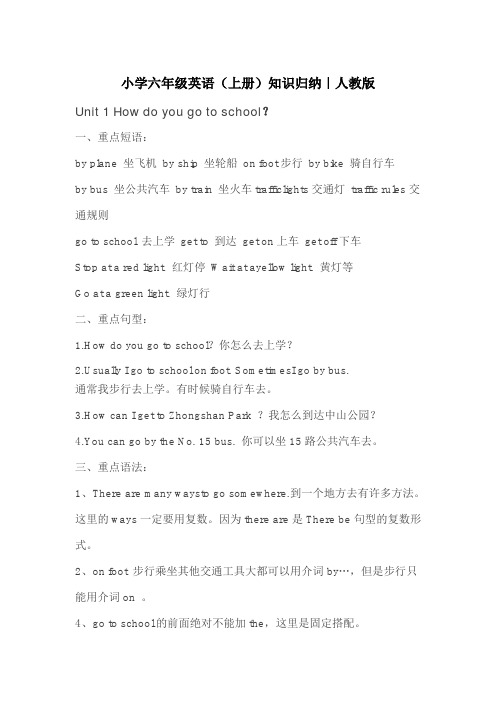
小学六年级英语(上册)知识归纳|人教版Unit 1 How do you go to school?一、重点短语:by plane 坐飞机by ship 坐轮船on foot步行by bike 骑自行车by bus 坐公共汽车by train 坐火车trafficlights交通灯traffic rules交通规则go to school 去上学get to 到达get on上车get off下车Stop at a red light. 红灯停Wait at ayellow light. 黄灯等Go at a green light. 绿灯行二、重点句型:1.How do you go to school?你怎么去上学?ually I go to school on foot. SometimesI go by bus.通常我步行去上学。
有时候骑自行车去。
3.How can I get to Zhongshan Park ?我怎么到达中山公园?4.You can go by the No. 15 bus. 你可以坐15路公共汽车去。
三、重点语法:1、There are many waysto go somewhere.到一个地方去有许多方法。
这里的ways一定要用复数。
因为there are是There be句型的复数形式。
2、on foot 步行乘坐其他交通工具大都可以用介词by…,但是步行只能用介词on 。
4、go to school的前面绝对不能加the,这里是固定搭配。
5、USA 和US 都是美国的意思。
另外America也是美国的意思。
6、go to the park 前面一定要加the. 如果要去的地方有具体的名字,就不能再加the ,如果要去的地方没有具体名字,都要在前面加the. (go to school除外。
)7、How do you go to …?你怎样到达某个地方?如果要问的是第三人称单数,则要用:How does he/she…go to …?8、反义词:get on(上车)---get off(下车)near(近的)—far(远的)fast(快的)—slow(慢的)because(因为)—why(为什么)same(相同的)—different(不同的)9、近义词:see you---goodbye sure---certainly---ofcourse10、频度副词:always 总是,一直usually 通常often经常sometimes 有时候never 从来不Unit 2 Where is the science museum?一、重点短语:library 图书馆post office 邮局hospital医院cinema 电影院bookstore书店science museum科学博物馆turnleft向左转turn right 向右转go straight 直行north北south南east东west西next to靠近、与……。
人教版六年级英语上册知识点重点难点考点汇总
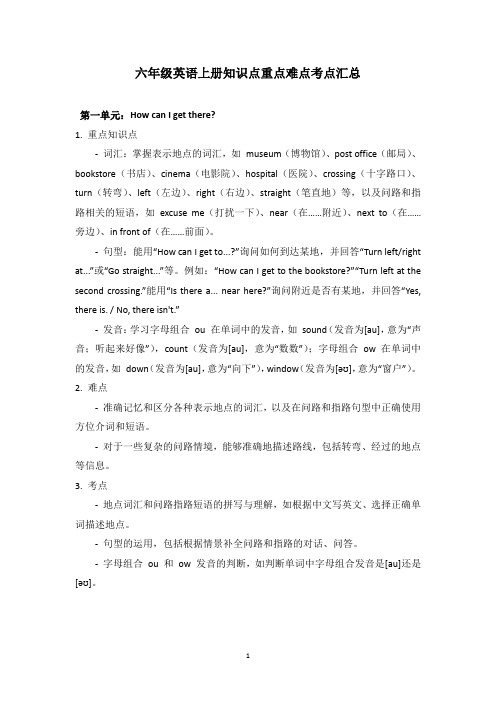
六年级英语上册知识点重点难点考点汇总第一单元:How can I get there?1. 重点知识点-词汇:掌握表示地点的词汇,如museum(博物馆)、post office(邮局)、bookstore(书店)、cinema(电影院)、hospital(医院)、crossing(十字路口)、turn(转弯)、left(左边)、right(右边)、straight(笔直地)等,以及问路和指路相关的短语,如excuse me(打扰一下)、near(在……附近)、next to(在……旁边)、in front of(在……前面)。
-句型:能用“How can I get to...?”询问如何到达某地,并回答“Turn left/right at...”或“Go straight...”等。
例如:“How can I get to the bookstore?”“Turn left at the second crossing.”能用“Is there a... near here?”询问附近是否有某地,并回答“Yes, there is. / No, there isn't.”-发音:学习字母组合ou 在单词中的发音,如sound(发音为[au],意为“声音;听起来好像”),count(发音为[au],意为“数数”);字母组合ow 在单词中的发音,如down(发音为[au],意为“向下”),window(发音为[əʊ],意为“窗户”)。
2. 难点-准确记忆和区分各种表示地点的词汇,以及在问路和指路句型中正确使用方位介词和短语。
-对于一些复杂的问路情境,能够准确地描述路线,包括转弯、经过的地点等信息。
3. 考点-地点词汇和问路指路短语的拼写与理解,如根据中文写英文、选择正确单词描述地点。
-句型的运用,包括根据情景补全问路和指路的对话、问答。
-字母组合ou 和ow 发音的判断,如判断单词中字母组合发音是[au]还是[əʊ]。
小学人教PEP英语六年级上册重点单词、短语、句型汇总
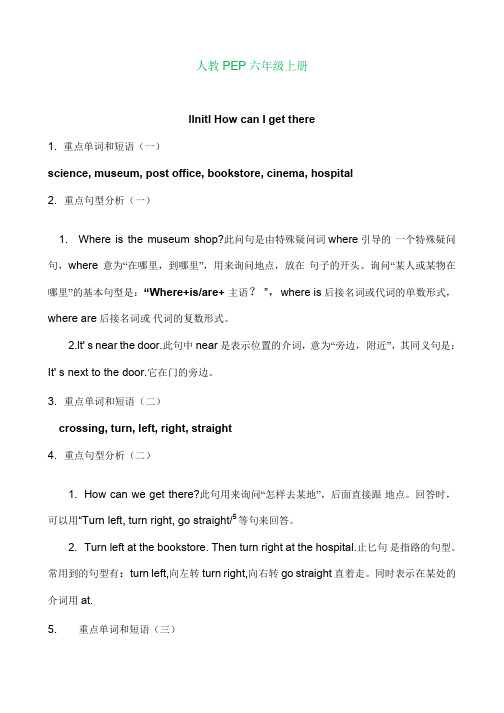
人教PEP六年级上册llnitl How can I get there1. 重点单词和短语(一)science, museum, post office, bookstore, cinema, hospital2. 重点句型分析(一)1. Where is the museum shop?此问句是由特殊疑问词where引导的一个特殊疑问句,where意为“在哪里,到哪里”,用来询问地点,放在句子的开头。
询问“某人或某物在哪里”的基本句型是:“Where+is/are+ 主语?”,where is后接名词或代词的单数形式,where are后接名词或代词的复数形式。
2.lt' s near the door.此句中near是表示位置的介词,意为“旁边,附近”,其同义句是:It' s next to the door.它在门的旁边。
3. 重点单词和短语(二)crossing, turn, left, right, straight4. 重点句型分析(二)1. How can we get there?此句用来询问“怎样去某地”,后面直接跟地点。
回答时,可以用“Turn left, turn right, go straight/5等句来回答。
2. Turn left at the bookstore. Then turn right at the hospital.止匕句是指路的句型。
常用到的句型有:turn left,向左转turn right,向右转go straight直着走。
同时表示在某处的介词用at.5. 重点单词和短语(三)Tasty, buy, London Eye, next to, far from, go straight, turn left, stomach 6. 重点句型分析(三)Is the Thames far from here? No.此句是个be动词开头的一般疑问句,其回答要用yes或no.句中的far from意为“离 ............................................. 远”。
人教精通版小学英语六年级上册单元知识点总结(全册)(完美版)

Unit1Igotoschoolat8:00.一、核心词汇1.描述日常活动的词汇cleanthewindow擦窗户cleanthedoor擦门cleanthefloor擦地板2.描述三餐的词汇breakfast早餐lunch午餐dinner晚餐3.描述时间的词汇morning早晨afternoon下午evening晚上; 傍晚4.频率副词often时常; 常常5.其他walk走; 步行every每一个easy容易difficult困难二、拓展词组描述日常活动的词组getup起床havebreakfast吃早餐gotoschool去上学havelunch吃午饭gohome回家havedinner吃晚饭watchTV看电视gotobed睡觉cookbreakfast做早餐teachEnglish教英语takeawalk散步readstories读故事seeafilm看电影playthepiano弹钢琴三、核心句型1.Igetupat7:30inthemorning. 我早晨七点半起床。
解读:此句是一个陈述句, 用来描述我在某一时刻所做的事情。
举一反三:Igotoschoolat8:00inthemorning. 我早晨八点去上学。
她不在上午六点半起床。
2.Shedoesn’tgetupat6:30inthemorning.解读: 此句是一个否定句, 用来描述某人在某一时刻没有做的事情。
举一反三:Shedoesn’tgetupat6:40.她不在六点四十分起床。
3.— WhatdoyoudoonSaturdays? 你星期六做什么?— Ioftengoandseeafilmwithmyparents. 我经常和我的父母一起去看电影。
解读:这是用来询问对方某天做什么及其回答的句子。
举一反三:— Whatdoyoudoontheweekend? 你周末做什么?— Ioftendohomework. 我经常做作业。
六年级人教版上册英语重点知识点
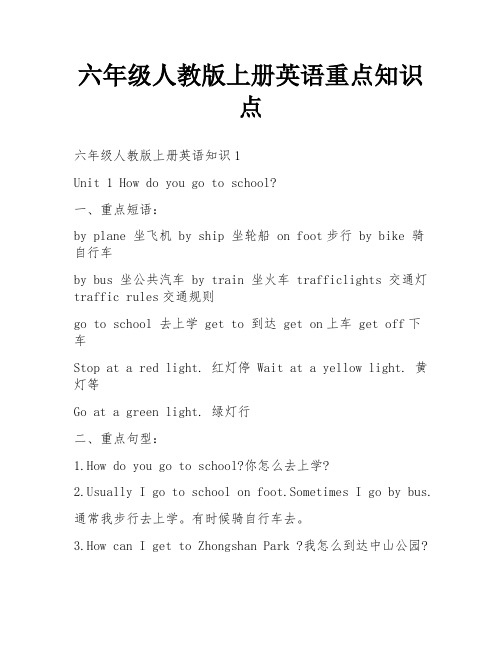
六年级人教版上册英语重点知识点六年级人教版上册英语知识1Unit 1 How do you go to school?一、重点短语:by plane 坐飞机 by ship 坐轮船 on foot步行 by bike 骑自行车by bus 坐公共汽车 by train 坐火车 trafficlights 交通灯traffic rules交通规则go to school 去上学 get to 到达 get on上车 get off下车Stop at a red light. 红灯停 Wait at a yellow light. 黄灯等Go at a green light. 绿灯行二、重点句型:1.How do you go to school?你怎么去上学?ually I go to school on foot.Sometimes I go by bus.通常我步行去上学。
有时候骑自行车去。
3.How can I get to Zhongshan Park ?我怎么到达中山公园?4.You can go by the No. 15 bus. 你可以坐15路公共汽车去。
三、重点语法:1、There are many ways to go somewhere.到一个地方去有许多方法。
这里的ways一定要用复数。
因为there are是There be句型的复数形式。
2、on foot 步行。
乘坐其他交通工具大都可以用介词by…,但是步行只能用介词on 。
3、go to school的前面绝对不能加the,这里是固定搭配。
4、USA 和 US 都是美国的意思。
另外America也是美国的意思。
5、go to the park 前面一定要加the. 如果要去的地方有具体的名字,就不能再加the ,如果要去的地方没有具体名字,都要在前面加the. ( go to school除外。
)6、How do you go to…?你怎样到达某个地方?如果要问的是第三人称单数,则要用:How does he/she…go to …?7、反义词:get on(上车)—get off(下车) near(近的)—far(远的)fast(快的)—slow(慢的)because(因为)—why(为什么) same(相同的)—different(不同的)8、近义词:see you—goodby esure—certainly—of course9、频度副词:always 总是,一直 usually 通常 often经常 sometimes 有时候 never 从来不六年级人教版上册英语知识2Unit 2 Where is the science museum?一、重点短语:library 图书馆 post office 邮局 hospital医院 cinema 电影院bookstore书店 science museum科学博物馆 turnleft向左转turn right 向右转 go straight 直行 north北 south南east东 west西 next to靠近、与……。
人教版英语六年级上册知识点总结
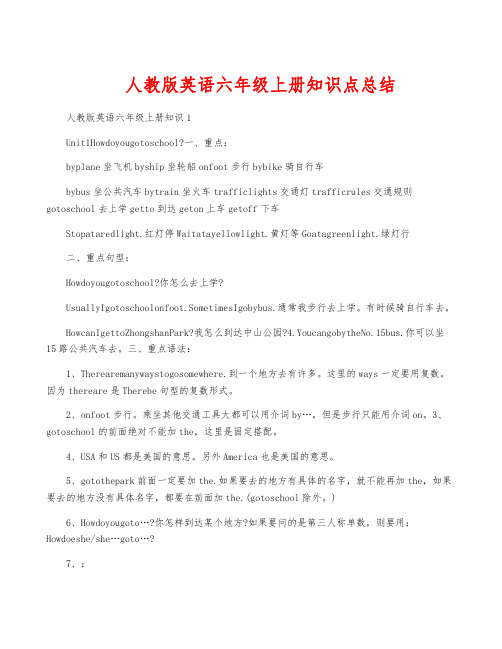
人教版英语六年级上册知识点总结人教版英语六年级上册知识1Unit1Howdoyougotoschool?一、重点:byplane坐飞机byship坐轮船onfoot步行bybike骑自行车bybus坐公共汽车bytrain坐火车trafficlights交通灯trafficrules交通规则gotoschool去上学getto到达geton上车getoff下车Stopataredlight.红灯停Waitatayellowlight.黄灯等Goatagreenlight.绿灯行二、重点句型:Howdoyougotoschool?你怎么去上学?UsuallyIgotoschoolonfoot.SometimesIgobybus.通常我步行去上学。
有时候骑自行车去。
HowcanIgettoZhongshanPark?我怎么到达中山公园?4.YoucangobytheNo.15bus.你可以坐15路公共汽车去。
三、重点语法:1、Therearemanywaystogosomewhere.到一个地方去有许多。
这里的ways一定要用复数。
因为thereare是Therebe句型的复数形式。
2、onfoot步行。
乘坐其他交通工具大都可以用介词by…,但是步行只能用介词on。
3、gotoschool的前面绝对不能加the,这里是固定搭配。
4、USA和US都是美国的意思。
另外America也是美国的意思。
5、gotothepark前面一定要加the.如果要去的地方有具体的名字,就不能再加the,如果要去的地方没有具体名字,都要在前面加the.(gotoschool除外。
)6、Howdoyougoto…?你怎样到达某个地方?如果要问的是第三人称单数,则要用:Howdoeshe/she…goto…?7、:geton(上车)—getoff(下车)near(近的)—far(远的)fast(快的)—slow(慢的)because(因为)—why(为什么)same(相同的)—different(不同的)8、:seeyou—goodbyesure—certainly—ofcourse9、频度副词:always总是,一直usually通常often经常sometimes有时候never从来不人教版英语六年级上册知识2Unit2Whereisthesciencemuseum?一、重点短语:library图书馆postoffice邮局hospital医院cinema电影院bookstore书店sciencemuseum科学博物馆turnleft向左转turnright向右转gostraight直行north北south 南east东west西nextto靠近、与……。
- 1、下载文档前请自行甄别文档内容的完整性,平台不提供额外的编辑、内容补充、找答案等附加服务。
- 2、"仅部分预览"的文档,不可在线预览部分如存在完整性等问题,可反馈申请退款(可完整预览的文档不适用该条件!)。
- 3、如文档侵犯您的权益,请联系客服反馈,我们会尽快为您处理(人工客服工作时间:9:00-18:30)。
Lesson 1I.单词俱乐部1.minute ['minit] 分钟2.primary ['praiməri] 初级的3.daily [`deili] 日常的4.dinner [`dinə ] 正餐II.词组大本营1. tell you about 告诉你…关于2. get up 起床3. go to school 去上学4. seven subjects 七门课5. be over 结束6. do some reading 读书,阅读7. have dinner吃晚餐8. after dinner饭后9.watch TV看电视 10. go to bed 去睡觉 11. best wishes良好祝愿III.句子大观园1. Let me tell you about my daily life. 让我告诉你我的每日生活。
2. We have seven subjects. 我们有七门课。
3. School is over at 3:30 in the afternoon. 学校下午3点半放学。
4. After dinner, I watch TV for 30 minutes and do some reading..晚饭后我看半小时电视和读书。
5. Can you tell me by e-mail? 你能通过电子邮件告诉我吗?Lesson 2I.单词俱乐部1. have [hæv] 有2. breakfast ['brekfəst] 早餐3.lunch [lʌntʃ] 午餐II.词组大本营1. go to school 去上学2. go to school 去上学3. go to bed 去睡觉4. watch TV看电视5. have breakfast吃早餐6. have lunch 吃午餐7. have dinner吃晚餐8. go home回家III.句子大观园1. I have breakfast at 7:30 in the morning. 我早晨7点半吃早餐。
2. I don’t have breakfast at 7:30 in the morning. 我不在早晨7点半吃早餐。
Lesson 3I.单词俱乐部1.cook [kuk] 烹调2. chant [tʃa:nt] 唱歌,歌谣II.词组大本营1. be happy to高兴……2. cook breakfast 做早餐3. learn English 学英语4. take a walk散步III.句子大观园1. I am very happy to get your e-mail. 我很高兴收到你的邮件。
2. Her students often learn English by singing, chanting and playing games.她的学生经常通过唱歌,歌谣和做游戏来学习英语。
3. After dinner she often takes a walk with my father. 晚饭后,她经常和我的父亲去散步4. She reads English stories for me. 她为我讲英语故事。
Lesson 4I.单词俱乐部1. walk [wɔːk] 散步2. afternoon [a:ftə'nu:n] 下午3. instead [in'sted] 代替II.词组大本营1. get up 起床2. cook breakfast 做早餐3. read stories 讲故事4. teach English 教英语5. take a walk 散步6. in groups 按小组7. a few photos of your family 几张你家的照片III.句子大观园1. She gets up at 6:00 in the morning. 她早上6点起床。
2. She doesn’t get up at 6:00 in the morning. 她早上6点不起床。
Lesson 5I.单词俱乐部1.film [film] 电影2.parents ['pεərənts]父母3.difficult ['difikəlt] 困难的4. always [ˈɔːlweɪz] 总是5.practise ['præktis] 练习II.词组大本营1. on Saturdays 在周六2. see a film 看电影3. play the piano 弹钢琴4. learn from 向……学习III.句子大观园1. I often go and see a film with my parents. 我经常和我的父母去看电影。
2. I uaually have piano lessons. 我经常上钢琴课3. Is it difficult to play the piano? 弹钢琴难吗?4. She practises it at home. 她在家练习。
Lesson 6I.单词俱乐部1. usually [[ˈjuːʒʊəlɪ] 通常2. difficult ['difikəlt] 困难的3. film [film] 电影4. easy ['i:zi] 容易的5. floor [flɔ:] 地板6. inside [in'said] 里面II.词组大本营1. see a film 看电影2. play the piano 弹钢琴3.clean the window 擦窗户4. clean the door 擦门5. clean the floor 擦地III.句子大观园1.What do you usually do on Saturdays? 你通常在周六做什么?2. I often go and see a film. 我经常去看电影。
3. What does Kate do on Saturdays? Kate在周六做什么?3. She usually plays the piano. 她通常弹钢琴。
Lesson 7I.单词俱乐部II .词组大本营 1. collect stamps 收集邮票 4. collect toy cars收集玩具汽车 2. a super car 一辆漂亮的汽车 5. so colourful 如此鲜艳3. your hobby 你的爱好 6. have a look 看一看III . 句子大观园1. Open the box and see. 打开盒子看一看。
2. Can I have a look, please? 我能看一看吗?3. I like collecting picture cards. 我喜欢收集卡片。
Lesson 8I .单词俱乐部 1. picture [ˈp ɪkt ʃə]图片,照片 4.hobby [ˈh ɒbɪ] 爱好2. car [k ɑː] 小汽车 5.colour [ˈk ʌl ə] 颜色3. collect [k əˈlekt]收集II .词组大本营1. collect toy cars 收集玩具汽车 3. collect maps 收集地图2. collect picture cards 收集图片 4. collect stamps 收集邮票 III . 句子大观园1. What ’s your hobby? 你的爱好是什么?2. My hobby is collecting maps. 我的爱好是收集地图。
Lesson 9I .单词俱乐部1. photo [ˈf əʊt əʊ] 照片 4. grandpa [ˈgr æn ˌp ɑː]爷爷2. plant [pl ɑːnt]种植 5. Grow [gr əʊ]种植3. flower [ˈfla ʊə]花 6.wonderful [ˈw ʌnd əf ʊl ] 极好的 II .词组大本营1. look at 看2. drink Chinese tea 喝茶3. plant flowers 种花 III . 句子大观园1. Do you want to look at my family photos? 你想看看我的家庭照片吗?2. My grandpa is fishing. 我的爷爷正在钓鱼。
3. She is singing at her birthday party. 她正在她的生日聚会上唱歌。
Lesson 10I .单词俱乐部 1.plant [pl ɑːnt]种植 2. flower [ˈfla ʊə]花II .词组大本营1. hobby [ˈh ɒb ɪ] 业余爱好2. collect [k əˈlekt] 收集 3. stamp [st æmp] 邮票4. paper [ˈpe ɪp ə]纸5. colourful [ˈk ʌl əf ʊl] 多彩的6. enjoy [ɪn ˈd ʒɔɪ] 享受7. toy [t ɔɪ] 玩具1. go fishing 去钓鱼2. plant flowers 种花3. cook meals 做饭III.句子大观园1.What’s your dad’s hobby? 你父亲的爱好是什么?2.His hobby is planting flowers. 他的爱好是种花。
3.What’s your grandpa’s hobby? 你爷爷的爱好是什么?4.His hobby is fishing. 他的爱好是钓鱼。
Lesson 11I.单词俱乐部1.cry [kraɪ] 叫喊 3. kid [k i d] 小孩2.cute [kjuːt] 可爱的;漂亮的 4. hungry ['hʌŋgr i]饥饿的II.词组大本营1.be interested in 对 3. make dolls 制作娃娃2.take photos 照相 4. take good care of 好好照顾III.句子大观园1.What are you interested in? 你对什么感兴趣?2.I’m interested in taking photos. 我对照相感兴趣。
3.She takes good care of the baby. 她好好照顾婴儿。
Lesson 12I.单词俱乐部puter[kəm'pjuːtə] 计算机 3. place [ple i s] 地方2.thick [θi k] 厚的 4. crane [kre i n] 鹤II.词组大本营1.play computer games 玩电脑游戏 2. make dolls 制作娃娃2.take photos 照相III.句子大观园1.What are you interested in? 你对什么2.I’m interested in taking photos. 我对照相感兴趣。
